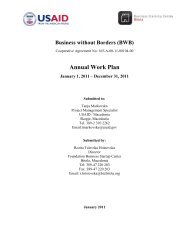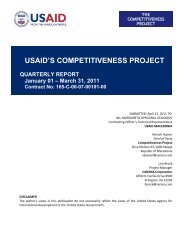FINAL REPORT - USAID Macedonia
FINAL REPORT - USAID Macedonia
FINAL REPORT - USAID Macedonia
Create successful ePaper yourself
Turn your PDF publications into a flip-book with our unique Google optimized e-Paper software.
(PgMP)® accreditations to earn revenue to support its sustainability. MyCareer initiated this training in April of<br />
2012, training 35 candidates from Stopanska Banka, Ein-sof, SNV World, and Sigma SB.<br />
Development of industry-led training and education programs<br />
MCP piloted industry-led training and education programs to facilitate long-term collaboration between<br />
education institutions and businesses to develop skills of future employees through formal education. These<br />
training programs involved significant cost-share and collaboration with the client and local training institutions<br />
in the design and delivery of training and relevant curricula. Examples are provided below:<br />
Training of animation and visual effects developers using revolving fund. During FY2009, MCP developed a<br />
revolving fund pilot aimed at training new recruits or employees to support business expansion and new<br />
business ventures, investments and/or strategic partnerships. Trainees paid 10% of training costs upfront, the<br />
company paid 20% and MCP Revolving Fund paid the final 70%. MCP also assisted in the design and delivery<br />
of the program. Upon training completion, hired recruits (or their employer) were expected to repay the<br />
Revolving Fund share (the 70%) within 6-8 months to replenish the fund. Trainees who were not employed<br />
immediately did not have to repay the fund.<br />
The revolving fund pilot involved went to training for 45 animators at fX3X, a leading digital and visual effects<br />
company, in the use of new software and animation technologies. Following the training, 40 animators were<br />
hired, and fX3X paid MCP back for the training cost.<br />
New academic program for construction materials. This program was developed in partnership with KNAUF,<br />
a German investor of construction materials, Municipality of Debar and its secondary school and MCP. Each<br />
party has agreed to support the process and initiate the new academic program to be introduced in the high<br />
school in Debar for students planning to pursue a career and employment in the construction sector. KNAUF<br />
supported the program with content and expertise; the Municipality licensed the program with the Ministry of<br />
Education and VET Centre. MCP supported the process by transferring expertise from the German company to<br />
local institutions. Twenty-five students took part in the first semester of the program.<br />
Modified curricula in partnership with Automotive cluster and local government: MCP facilitated a<br />
partnership between RUEN IT, an automotive component manufacturer, local governments and secondary<br />
schools in Stip, Kocani and Vinica, and the TVET Centre to update the curricula to reflect the latest practices<br />
and machinery in the components manufacturing. The project assembled a group of experts from business<br />
community, TVETs and schools to review the curricula and make necessary changes. RUEN provided teachers<br />
with training in state-of-the-art machinery and practices and offered three-month internships to 10 students, one<br />
of which received a full-time job upon completion.<br />
LOTUS Taxi training. In the beginning of October 2009 the project supported LOTUS, a taxi company, to<br />
establish a School for Professional Taxi Drivers and train future taxi drivers to improve their soft skills, which<br />
are considered lacking for this profession in <strong>Macedonia</strong>. Some topics were: communications, regulations in<br />
navigation, knowledge of streets and landmarks and use of radio stations and the meter. Close to 100 applicants<br />
took part in the training, of which over 30 received offers of employment.<br />
Workforce development working group<br />
Many gaps impacting the quality of <strong>Macedonia</strong>’s workforce are systemic, stemming from policy weakness,<br />
whereas in other cases, outdated curricula, educational practices, career development practices and even<br />
employer practices play a role. MCP helped establish the National Workforce Development working group as a<br />
forum to connect government, education and business stakeholders for a unified effort to address these gaps and<br />
build a more qualified and globally competitive labor pool. Activities include lobbying for issues of common<br />
interest, providing policy recommendations, and developing initiatives focusing on workforce development.<br />
The project team also engaged the newly established HR association and AmCham <strong>Macedonia</strong> to plan a joint<br />
working group meeting and avoid separate HR-focused activities. It is expected that in the future, the HR<br />
Association will have a leading role in organizing working group meetings, whereas MCP and AmCham would<br />
take care of the logistics and overall support of the events.<br />
45




